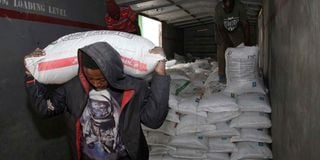Relief as State ships in 12 million bags of fertiliser

Workers offload bags of subsidised fertiliser from a train wagon at the National Cereals and Produce Board depot in Elburgon, Nakuru County on August 31, 2023.
What you need to know:
- Mr Linturi blamed logistical challenges for delays in the delivery of the subsidised fertiliser.
- The government-issue subsidised fertiliser is being sold at Sh2,500.
The national government has imported 12.5 million bags of fertiliser, offering some relief to maize farmers in the North Rift region ahead of the planting season.
Agriculture Cabinet Secretary Mithika Linturi said a consignment of the farm input had been delivered to National Cereals and Produce Board (NCPB) depots in Eldoret and Kitale, among other towns in the region, to address a scarcity of the commodity.
Mr Linturi blamed logistical challenges for delays in the delivery of the subsidised fertiliser, which has led to a biting shortage of the agricultural input.
“We closed the tenders in December and I want to tell the suppliers that we won't tolerate missed deadlines,” the CS said in Eldoret on Friday. He disclosed that his ministry was working with the county governments to establish fertiliser outlets in each of the devolved units.
The government-issue subsidised fertiliser is being sold at Sh2,500, while Di-ammonium Phosphate (DAP), which is popular with most farmers, is being sold at Sh6,200 in most outlets.
According to the latest Ministry of Agriculture data, about five million farmers are registered for the subsidy scheme, with 313,959 bags having been issued in 23 counties.
“About 418,267 fertiliser stocks valued at Sh790.88 million are at NCPB and Kenya National Trading Corporation warehouses,” the ministry revealed in a report. The daily transaction for the fertiliser is estimated at Sh80,217,650.
Uasin Gishu and Trans Nzoia counties have a balance of 68,236 and 17,071 bags respectively. The country needs about 650,000 tonnes of fertiliser annually.
But questions have been raised over the quality of the fertiliser that is being imported by the government. Dr Timothy Njagi, an expert with agricultural think-tank Tegemeo Institute, told Nation in an earlier interview that the government-issue NPK 23:23 fertiliser had 46 per cent less nitrogen, phosphorus and potassium than other brands.
“Because of the lower nutrient content, farmers have to apply an extra bag of the fertiliser compared to DAP to achieve higher fertilisation,” Dr Njagi said.
At the same time, a study by the Kenya Agricultural and Livestock Organisation (Kalro) has revealed that farmers in Uasin Gishu and Trans-Nzoia counties are losing an average of 10 bags of maize per harvest due to declining soil fertility caused by continuous application of conventional fertiliser. Most farmers do not know the acidity of their soil to determine the type of fertiliser to apply to their crops, the study said.
“Farmers are encouraged to test the soil before applying fertiliser to enable them to achieve high yields,” said Mr Mathew Lang'at, a crop production and development officer based in Eldoret.
It costs farmers between Sh1,500 and Sh2,000 to take samples for soil acidity testing at the Kenya Plant Health and Inspectorate Service (Kephis) and Kalro, among other institutions that carry out soil analysis.
According to agricultural experts, crop production in Africa has declined by between two and five per cent in the past 10 years as a result of land degradation caused by increased soil acidity.





